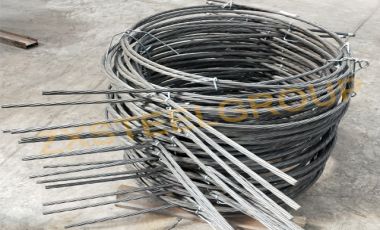
The 15.2 mm cable bolt is widely utilized in underground mining for effective ground support. Its purpose is to reinforce and stabilize rock formations, ensuring the safety of personnel and equipment. This bolt is made from high-strength steel cables and is typically anchored in place using either resin or cement grout, which hardens to create a robust bond between the bolt and the surrounding rock mass. Here’s a closer look at its specifications, installation techniques, and advantages in mine support.
The 15.2 mm cable bolt, often referred to as a "stranded cable," is constructed from high-tensile steel wires twisted together. This design creates flexibility while maintaining excellent load-bearing capacity, essential for handling the intense stress experienced in mining environments. The 15.2 mm diameter is a common standard due to its balance of strength, durability, and manageability in installation. The bolt can vary in length depending on the depth of the hole and the extent of ground support required, ranging from a few meters up to 10 or more in deeper mines.
These bolts come in different configurations, such as plain or bulbed designs, to adapt to varying conditions in rock strata. Bulbed cable bolts, which feature thicker segments along their length, offer enhanced anchorage by increasing the mechanical interlock with grout. This design is beneficial in fractured or weak rock formations where additional gripping is needed to prevent bolt slippage.
The installation of a 15.2 mm cable bolt involves several critical steps, often requiring precision to ensure its effectiveness. The procedure generally starts with drilling a borehole into the rock at a designated angle and depth. This borehole is typically deeper than standard rock bolts, enabling the cable bolt to reach more stable rock strata for better support. Once the borehole is drilled, the cable bolt is inserted, and resin or cement grout is injected into the hole.
Grouting the bolt ensures that the cable and surrounding rock mass are bound together tightly. Cement grout is more commonly used because it creates a firm, long-lasting bond, although resin grouts are sometimes preferred for rapid setting times. The grouting process is crucial, as it prevents movement in the rock layers, limiting deformation and collapse.
Additionally, cable bolts may be installed in pre-tensioned configurations to provide immediate support, an advantage in situations with shifting ground or highly fractured rock. Pre-tensioning involves applying a tensile load on the bolt to actively compress the surrounding rock, creating a tighter rock mass that is less susceptible to shear and tensile failures.
Using 15.2 mm cable bolts for mine support offers several advantages. Primarily, their high tensile strength allows them to sustain significant loads, making them ideal for supporting large rock sections that could otherwise become unstable. Cable bolts are versatile and can be tailored to various rock conditions, accommodating changes in the geology and stress distribution.
The flexibility of the cable structure allows it to bend and move with the ground as pressures shift, which is an important feature in dynamic environments like mines. This adaptability helps to prevent fractures and movement that could compromise the support system. Furthermore, the 15.2 mm cable bolt’s ease of installation in deep and complex geometries makes it suitable for underground mining operations where traditional bolts might not suffice.
15.2 mm cable bolts are used primarily in underground mines, both for permanent and temporary support. They are commonly applied in deep mine tunnels, shafts, and stope walls, where substantial support is essential to maintain stability. These bolts are also found in coal mines, hard rock mines, and construction applications like tunnels.
While effective, cable bolts do have limitations. For example, they require skilled installation and are more time-consuming to install than conventional rock bolts. Additionally, because of their reliance on grouting, they may not perform as well in wet environments where water can weaken the grout over time.
In summary, the 15.2 mm cable bolt is a vital tool for ground support in mining due to its strength, flexibility, and adaptability to various geological conditions. Its design and installation are well-suited to challenging underground environments, providing a reliable solution for stabilizing rock formations and enhancing the safety of mining operations.
Address: No. 1738, 17th Floor, No. 1 Mall, Shangdu Road, Zhengdong New District, Zhengzhou City, Henan Province, China
Email: zxminesupport@zxsteelgroup.com
Tel: +86-199 3712 3680
© 2020 ZXSTEELGROUP